
Mount Zion is a city in Carroll County, Georgia, United States. The population was 1,696 at the 2010 census.

Mary Ann Todd Lincoln served as the first lady of the United States from 1861 until the assassination of her husband, President Abraham Lincoln, in 1865.
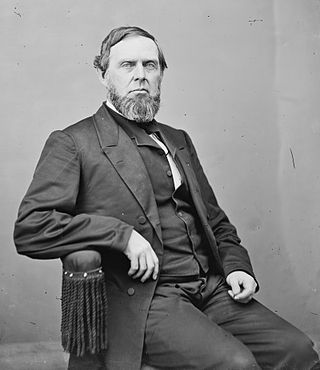
James Harlan was an attorney and politician, a member of the United States Senate, a U.S. Cabinet Secretary at the United States Department of Interior under President Andrew Johnson, and a Federal Judge.

Forty acres and a mule was part of Special Field Orders No. 15, a wartime order proclaimed by Union General William Tecumseh Sherman on January 16, 1865, during the American Civil War, to allot land to some freed families, in plots of land no larger than 40 acres (16 ha). Sherman later ordered the army to lend mules for the agrarian reform effort. The field orders followed a series of conversations between Secretary of War Edwin M. Stanton and Radical Republican abolitionists Charles Sumner and Thaddeus Stevens following disruptions to the institution of slavery provoked by the American Civil War. Many freed people believed, after being told by various political figures, that they had a right to own the land they had been forced to work as slaves and were eager to control their own property. Freed people widely expected to legally claim 40 acres of land. However, Abraham Lincoln's successor as president, Andrew Johnson, tried to reverse the intent of Sherman's wartime Order No. 15 and similar provisions included in the second Freedmen's Bureau bills.
James Mitchell may refer to:

The African Methodist Episcopal Zion Church, or the AME Zion Church (AMEZ) is a historically African-American Christian denomination based in the United States. It was officially formed in 1821 in New York City, but operated for a number of years before then. The African Methodist Episcopal Zion Church adheres to Wesleyan-Arminian theology.
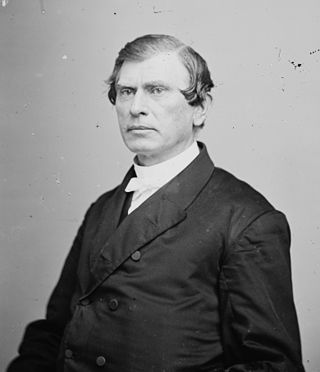
Matthew Simpson was an American bishop of the Methodist Episcopal Church, elected in 1852 and based mainly in Philadelphia. During the Reconstruction Era after the Civil War, most evangelical denominations in the North, especially the Methodists, were initially strong supporters of radical policies that favored the Freedmen and distrusted the Southern whites. However, by the late 1860s in border state conferences, the MEC North moved well away from their work with the Freedmen's Bureau and often sided with the grievances of Southern white members. Bishop Simpson played a leading role in mobilizing the Northern Methodists for the cause. His biographer calls him the "High Priest of the Radical Republicans."

Albert Jeremiah Beveridge was an American historian and United States Senator from Indiana. He was an intellectual leader of the Progressive Era and a biographer of Chief Justice John Marshall and President Abraham Lincoln.
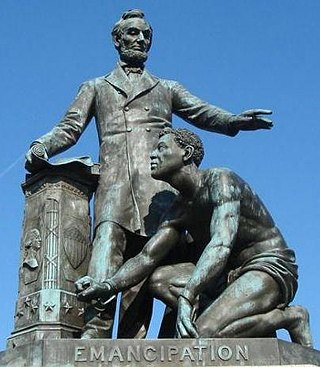
Abraham Lincoln's position on slavery in the United States is one of the most discussed aspects of his life. Lincoln frequently expressed his moral opposition to slavery in public and private. "I am naturally anti-slavery. If slavery is not wrong, nothing is wrong," he stated. "I can not remember when I did not so think, and feel." However, the question of what to do about it and how to end it, given that it was so firmly embedded in the nation's constitutional framework and in the economy of much of the country, even though concentrated in only the Southern United States, was complex and politically challenging. In addition, there was the unanswered question, which Lincoln had to deal with, of what would become of the four million slaves if liberated: how they would earn a living in a society that had almost always rejected them or looked down on their very presence.
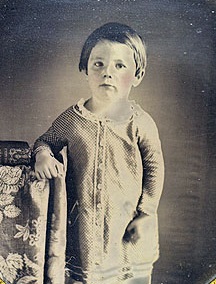
Edward Baker Lincoln was the second son of Abraham Lincoln and Mary Todd Lincoln. He was named after Lincoln's close friend, Edward Dickinson Baker. Both Abraham and Mary spelled his name "Eddy"; however, the National Park Service uses "Eddie" as a nickname and the nickname also appears spelled this way on his crypt at the Lincoln tomb.

Daniel Alexander Payne was an American bishop, educator, college administrator and author. A major shaper of the African Methodist Episcopal Church (AME), Payne stressed education and preparation of ministers and introduced more order in the church, becoming its sixth bishop and serving for more than four decades (1852–1893) as well as becoming one of the founders of Wilberforce University in Ohio in 1856. In 1863, the AME Church bought the college and chose Payne to lead it; he became the first African-American president of a college in the United States and served in that position until 1877.
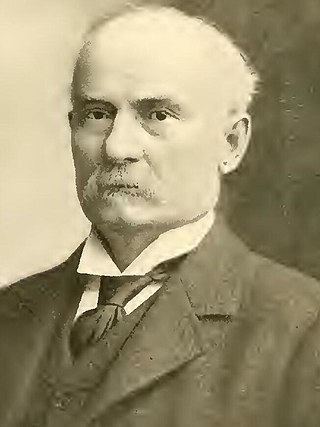
Robert Roberts Hitt was an American diplomat and Republican politician from Illinois. He served briefly as assistant secretary of state in the short-lived administration of James A. Garfield but resigned alongside Secretary of State James G. Blaine after Garfield's assassination in 1881. He returned to Washington to represent Northwestern Illinois in the United States House of Representatives from 1882 to his death. After 1885, he was the senior Republican on the House Committee on Foreign Affairs, which he chaired from 1889 to 1891 and 1895 until his death in 1906.
Mary Raymond Andrews was an American writer. She is best known for a widely read short story about US President Abraham Lincoln, "The Perfect Tribute", which was adapted for film twice and sold 600,000 copies when published as a standalone volume.

Edward Wilmot Blyden was an Americo-Liberian educator, writer, diplomat, and politician who was primarily active in West Africa. Born in the Danish West Indies, he joined the waves of black immigrants from the Americas who migrated to Liberia. Blyden became a teacher for five years in the British West African colony of Sierra Leone in the early twentieth century. His major writing were on pan-Africanism which later became influential throughout West Africa, attracting attention in countries such as the United States as well. His ideas went on to influence the likes of Marcus Garvey, George Padmore and Kwame Nkrumah.

Albert Freeman Africanus King was an English-born American physician who was pressed into service at the assassination of Abraham Lincoln on 14 April 1865. He was one of a few physicians who served in both the Confederate States Army and the United States Army during the American Civil War. In addition, King was one of the earliest to suggest the connection between mosquitos and malaria.

Linconia was the name of a proposed Central American colony suggested by Republican United States Senator Samuel Pomeroy of Kansas in 1862, after U.S. President Abraham Lincoln asked the Senator and United States Secretary of the Interior Caleb Smith to work on a plan to resettle freed African Americans from the United States.

James Cephas Derby (1818–1892) was an American book publisher in New York state.

The Association of Lincoln Presenters is a membership organization founded by Dan Bassuk in 1990. It was established as a members' society for impersonators of 16th president of the United States, Abraham Lincoln. The group has been the subject of a feature-length documentary and a photography exhibition by Greta Pratt.
The Clifton Conference was a gathering of religious leaders held by William N. Hartshorn at his summer home in Clifton, Massachusetts. Five conferences are known to have been held, between 1901 and 1908.
















